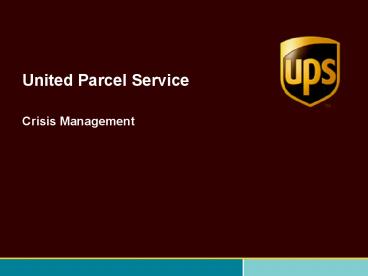United Parcel Service - PowerPoint PPT Presentation
Title:
United Parcel Service
Description:
United Parcel Service Crisis Management United Parcel Service Worldwide Facts Founded: August 28, 1907, in Seattle, Wash., USA World Headquarters: Atlanta, Ga., USA ... – PowerPoint PPT presentation
Number of Views:685
Avg rating:3.0/5.0
Title: United Parcel Service
1
United Parcel Service
- Crisis Management
2
United Parcel ServiceWorldwide Facts
- Founded August 28, 1907, in Seattle, Wash., USA
- World Headquarters Atlanta, Ga., USA
- World Wide Web Address www.ups.com
- Chairman CEO Scott Davis
- 2009 Revenue 45.3 billion
- Employees 408,000 Worldwide (340,000 U.S.
68,000 International) - 2009 Revenue 37.9 billion
- 2009 Delivery Volume 3.8 billion packages and
documents (15.1 million per day) - Service Area More than 200 countries and
territories Every address in North America and
Europe - Operating Facilities 1,801
3
United Parcel ServiceCrisis Management
- Crisis Management Mission Statement
- We seek to maintain a constant state of readiness
should UPS become exposed to an unexpected act of
a critical magnitude - We maintain a crisis management strategy model to
assist us in the prevention, response and
restoration of our business - We strive to protect the reputation and interests
of UPS, Our People, Our Customers, Our
Shareowners, and Our Communities - We will conduct ourselves responsibly, sincerely,
honestly and with the utmost integrity to ensure
the safety, security and well-being of all of our
stakeholders
4
United Parcel ServiceCrisis Management
- Crisis Management
- Corporate team to address needs of company during
crisis situations - Cross functional team to insure minimal
disruption and visibility to our customers - Department heads or designee from each function
- Designated members from function to provide
detailed planning for all levels - Operations, Human Resources, Communications, etc.
- The following slides will address the
transportation portion of the Crisis Management
structure at UPS
5
United Parcel ServiceCrisis Management -
Transportation
- Contingency
- Short term
- Usually weather related
- Alternate Ops
- Long term
- Disaster situation
6
United Parcel ServiceCrisis Management -
Transportation
- Contingency
- Short term operating disruption
- Winter storms, hurricanes, etc
- Diversion of volume
- Alternate locations
- Minimize service impact
- Alternative modes of transportation
- Delay movement into affected area
- Rail vs Ground
- Ground vs Air
- Temporary, ad-hoc changes
- Customer notification
- Service impact
7
United Parcel ServiceCrisis Management -
Transportation
- Contingency
- Planning handled locally
- District implementation
- Support from Regions/Corporate
- Scope of situation will determine support
requirements - Return to normal operating plans
8
United Parcel ServiceCrisis Management -
Transportation
- Contingency - Consequences
- Staffing
- During disruption (individuals affected)
- Post disruption (catching up)
- Cost
- Transportation around affected area
- Staffed operations with no work
- Insufficient staffing when catching up
- Service
- Local delays during disruption are expected
- Network delays due to disruption are not expected
9
United Parcel ServiceCrisis Management -
Transportation
- Contingency Keys to Success
- Communication
- Our people
- Our customers
- Managing expectations
- Our people
- Our customers
10
United Parcel ServiceCrisis Management -
Transportation
- Alternate Ops
- Long term operating disruption
- Loss of facility (catastrophe, pandemic, etc)
- Diversion of volume
- Alternate locations
- Minimize service impact
- Alternative modes of transportation
- New trains
- Re-routing of ground feeds
- Re-routing aircraft
- Permanent, long-term changes
- Transparent to customer
- Service impact
11
United Parcel ServiceCrisis Management -
Transportation
- Alternate Ops
- Planning handled through Corporate
- Pre-determined plans
- Corporate/region team implementation
- Plan becomes the norm
12
United Parcel ServiceCrisis Management -
Transportation
- Alternate Ops - Consequences
- Staffing
- Available workers are not in area where recovery
operations exist - Existing workers not available due to disaster
(Pandemic) - Cost
- Initial contingency operation until Alternate Op
in place - Alternate Op typically a more expensive plan
- Service
- Initial contingency will cause temporary service
issues - Cost vs maintaining existing service levels
- Alternate Ops are planned at current service
levels - Operating costs could be reduced with change of
service
13
United Parcel ServiceCrisis Management -
Transportation
- Alternate Ops Keys to Success
- Communication
- Our people
- Our customers
- Managing expectations
- Our people
- Our customers
14
United Parcel ServiceCrisis Management -
Transportation
- SUMMARY
- Maintain good Contingency and Alternate Op plans
- Update as necessary when operating conditions
change - Make sure employees understand the plan
- Role play scenarios to ensure actions are sound
- Make sure everyone knows their role
- Hope that you never have to use plans, but if you
do, communicate clearly with the people and the
customers
15
United Parcel Service
- Thank you!































